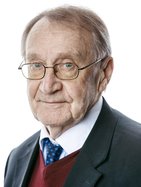
Sagdeev Roald
Distinguished Professor at the University of Maryland;of the Space Research Institute of the Russian Academy of Sciences; Academician, Russian Academy of Sciences (Russia/ United States)
Roald Sagdeev was born in Moscow in December of 1932, Roald Sagdeev was four years when he was taken by his parents to Kazan where he graduated from a senior high school and then travelled to Moscow to enter the Lomonosov University.
He worked at the Kurchatov Institute of Atomic Energy and the Nuclear Physics Institute of the USSR Academy of Sciences' Siberian branch. He became Correspondent member of the USSR Academy of Sciences in 1964, and Academician of its General Physics and Astronomy Department in 1968. In 1973–1988 he was Director of the USSR Academy of Science's Space Research Institute.
Roald Sagdeev did pioneering work in today's plasma physics and its applications in controlled thermonuclear fusion, space research and astrophysics. He also guided research programs in various space missions such as Cosmos, Prognoz, Intercosmos and Meteor, Astron and Mars, and Venera, and the Soyuz and Salut orbital complexes. He was in charge of research in the Vega international project, the first project to be implemented through global scientific cooperation. As a sign of its profound appreciation of his achievements the government awarded him the Lenin Prize in 1984 and the title of Hero of Socialist Labor in 1986.
He is a leader of the global scientific community for peace. Roald Sagdeev headed the Committee of Soviet Scientists for Peace and against the Nuclear Threat. He was elected People's Deputy of the USSR.
Academician Roald Sagdeev has been Professor of Maryland University since 1989 where he headed the East-West Center. He is also Chief Research Fellow at the Space Research Institute of the Russian Academy of Sciences, a foreign member of the US National Academy of Sciences, the Pontifical Academy of Sciences (Vatican), and the Royal Swedish Academy of Sciences.
He is also a member of the Max Plank Society (Germany's Academy of Sciences). He is a member of the Supervisory Council of the Luxembourg Forum on Preventing Nuclear Catastrophe.